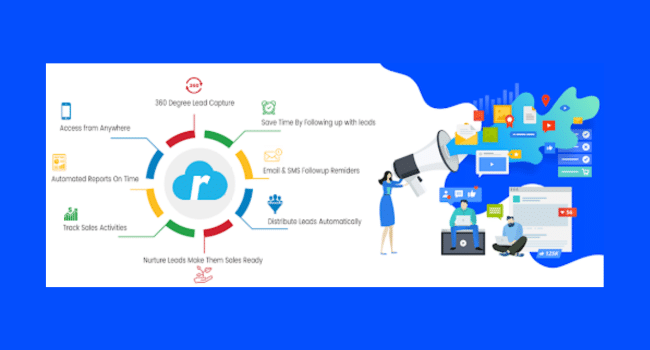Table of Contents
Amid the changing business world, keeping up means not just adjusting to changes but also making the most of new technology. One major game-changer that’s shaking up how businesses handle sales is the state-of-the-art lead management system. In this article, we’ll try to understand why these sales CRM solutions, how they affect sales processes, and how they can transform your customer-getting strategies.
Understanding How The Sales Work
Before we start, let’s first learn how sales work nowadays. Thanks to the rise of the digital era, customers are different now. They do their homework before buying things. This means businesses need to be more personal and precise to get potential customers interested and keep them coming back.
Customers now have more knowledge; they do thorough research before buying. This change means businesses need to personalize their approach to engage and convert potential customers into loyal buyers.
The Role of Lead Management Software in Building a Robust Sales Pipeline
Lead management tools are extremely useful for making the entire process of handling leads smoother and more efficient. From the first interaction with a lead to converting them into a customer and even after that, these platforms provide a central place to manage, track, and nurture leads. Let’s see how modern lead management systems can transform your sales pipeline;
Improved Lead Tracking and Organization: One of the main purposes of lead management software is to offer a structured and orderly way to track leads. Experience the shift from tedious spreadsheet scouring or feeling overwhelmed by disorganized data. Empowered by these tools, businesses can now categorize, segment, and prioritize leads according to different factors, allowing for better and more precise targeted marketing strategies.
Tailored Interaction: Getting to know your leads on a deeper level is crucial for building strong connections. Modern lead management tools do more than just collect basic contact details. They help businesses gather and study information about lead behavior, preferences, and how they engage with your brand. Armed with this knowledge, you can customize your communication to resonate with each lead, creating a more personalized and meaningful customer experience.
Efficient Lead Assignment: When dealing with a large number of leads, it’s essential to distribute them efficiently. Lead management systems automate the process of assigning leads to the right sales team members based on specific criteria. guarantees that leads are handled swiftly and strategically, reducing response times and enhancing the chances of converting them into customers.
Automated Lead Cultivation: Nurturing leads demands timely and pertinent communication. With lead management systems, you can automate the process, sending targeted content and messages when they’re most needed in the customer journey. This not just conserves time but also guarantees that leads receive pertinent information precisely when needed, boosting the chances of converting them into customers.
Instant Analytics and Reporting: Making decisions based on data is crucial for successful sales strategies. Advanced lead management tools offer real-time analytics and reports, giving insights into how your sales pipeline is performing. From the rate of converting leads into customers to the effectiveness of particular marketing strategies, these tools aid businesses in making informed modifications and continuously refining their methods.
Integration Abilities: To truly transform your sales process, your CRM lead management system should easily connect with other important business tools. Whether you’re using CRM software, marketing automation platforms, or communication tools, integrating them guarantees a smooth and coordinated approach across all aspects of your business operations.
Scalability and Adaptability: With the growth of your business, your tools should also scale accordingly. Modern CRM systems are designed to be scalable, adjusting to the changing needs and scale of your business. Whether you’re starting small or already established as a large enterprise, these solutions provide the adaptability to expand your operations without compromising efficiency.
Better Sales Prediction: Guessing future sales and setting practical goals is a crucial part of planning ahead. Sales CRM systems, with their strong analytics and tracking of past data, empower businesses to make more precise sales predictions. This insight allows for proactive decision-making, ensuring your team is ready to tackle future challenges and seize opportunities.
Improved Teamwork and Communication: Achieving sales targets often involves teamwork across various departments. Modern CRM lead management systems encourage smooth communication and collaboration by offering a central hub for sharing updates and information. This guarantees that all participants in the sales process are adequately informed and collaborating efficiently.
Customer Loyalty and Selling More: While getting new customers is important, keeping the ones you have is just as vital. CRM lead management systems offer benefits beyond the first sale, helping to keep customers engaged and relationships strong. By using customer information and insights, businesses can find chances to sell more or offer additional products, increasing the value of each customer over time.
Conclusion
In the changing world of sales and attracting customers, businesses can’t stick to old ways if they want to keep up. Modern sales CRM systems offer a big change, completely changing how businesses handle their sales processes. From better tracking of leads and personalized interaction to automated tasks and instant data analysis, these tools give businesses the power to not just keep pace with changes, but to lead them. As you think about the future of your sales plan, embracing these advanced lead management systems could be the key to achieving remarkable growth and success in your business ventures.
